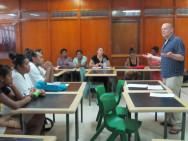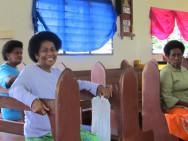How to Beat Diabetes
Philip Szmedra, had been a professor at the University of South Pacific in Suva, Fiji. While there, he saw firsthand how the dramatic change in diet that signaled the shift away from home grown to store-bought foods, created an epidemic of diabetes in the country. He came to understand that type-two diabetes could be managed effectively through changes in lifestyle and diet. Knowing that much of the population could not be effectively reached through written communication of that message, he decided that street theater would be the best means available for demonstrating effectively and dramatically all that diabetic patients needed to do to help themselves. Having no background in theater, he was told about my work and how it addressed what he was trying to do. It just so happened that, at the time, he had moved to Americus, Georgia and was/is a professor of economics at Georgia Southwestern State University, and that he and I shared the same zip code. It just so happened he also graduated from high school in Rochester, New York, as I had, and also spent a lot of time in Bulgaria. A partnership and friendship was forged that continues to this day.
The writing challenge was to first learn about the disease and how it could be controlled. Phil supplied me with people to interview. I then made a pre-project launch trip to Fiji to visit the diabetes clinic in Labasa where the project was to take place, and interviewed doctors, nurses, and patients about the disease. I also saw where the patients lined up and figured out how I could surround them with a performance while they waited for treatment. From this, I developed several scripts that could be performed there, some using as many as twelve actors, and some using only three. Still, these scripts had to be translated into the native vernacular and performed. Phil’s connections at the USP led to the addition of famed Fijian writer and professor Mohit Prassad, who joined the team and oversaw the production of the show. He worked with me to make the dialogue more friendly to the ears of native Fijians, and we made adjustments to the script accordingly. Mohit recruited students from the University’s Labasa campus who acted in the performance. Phil worked with another colleague from the University, Anand Chand and they worked together to identify a control group of patients who had seen the play, and compared their blood sugar readings over time to those who had not seen the play. Their data confirmed a positive link between seeing the play and being influenced by it to modify their lifestyles and experiencing subsequent lowered blood sugar levels.
The plays remain available to be performed in other settings through partnerships with other organizations interested in addressing the diabetes epidemic in their state or country.


